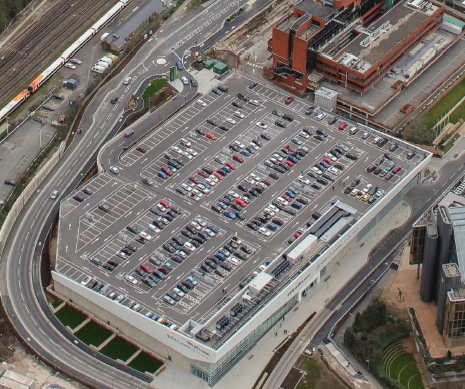A tough, durable and widely used waterproofing system for centuries, Mastic asphalt has been the system of choice for waterproofing roofs, flooring and tanking. With its inherent strength and market leading longevity, a new generation of mastic asphalts offering greater flexibility, durability and a wide range of colours are being used extensively in design situations where sustained traffic is likely – resulting in this traditional material being seen as the cost effective waterproofing solution for car park applications.
Car parks are different from other buildings as they are exposed and vehicles are in direct contact with the structure, causing it to wear out. They are inherently complex to waterproof as they comprise an array of elements from exposed top levels to heavily trafficked access ramps. Since the proliferation of multi-storey parking facilities in the 1960s, the application of an all-encompassing waterproof coating has become a critical element in car park design.
The open air nature of a car park’s top deck means that it will be subjected to all forms of weather, which is then transferred to internal levels by cars and pedestrians. To prevent water ingress into the concrete structure, the waterproofing specification throughout the car park must be of the highest standard. The traditional approach was to overlay the porous cement screeds and concrete decks with a voidless and totally waterproof layer of mastic asphalt.
While mastic asphalt was always a popular specification on car park projects in the past, a new generation of mastic asphalts has been developed by mastic asphalt manufacturers to meet the changing needs of architects, contractors and clients.
A key factor in the material’s resurgence is that the new products contain polymer formulations – giving it more flexibility, durability and consistent quality in application. Also, they can now be coated with an array of attractive colours for car park operators to clearly mark out individual parking spaces, disabled and family bays, and pedestrian walkways.
These modern mastic asphalts are produced in factory controlled conditions and then delivered to site ready for application. This process helps to maintain the quality of the material, whilst also enabling the manufacturer to produce a material bespoke to the project. For example, mastic asphalt can now be formulated to take into account the local climate or specific traffic conditions.
Three factors the contractor must consider when selecting the mastic asphalt to use are; design, budget and timescale. By taking into account the type of traffic (for example cars or HGVs), the available budget and the durability performance required of the material – architects and contractors can specify a mastic asphalt waterproofing and decking system that fits the bill both now and long into the future.

